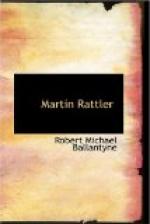They had cold meat of several kinds, and a hot steak of venison just killed that morning, which the hermit cooked while his guests were engaged with the other viands. There was also excellent coffee, and superb cream, besides cakes made of a species of coarse flour or meal, fruits of various kinds, arid very fine honey.
“Arrah! ye’ve the hoith o’ livin’ here!” cried Barney, smacking his lips as he held out his plate for another supply of a species of meat which resembled chicken in tenderness and flavour. “What sort o’ bird or baste may that be, now, av’ I may ask ye, Mister—what’s yer name?”
“My name is Carlos,” replied the hermit, gravely; “and this is the flesh of the Armadillo.”
“Arma—what—o?” inquired Barney.
“Arma_dillo_,” repeated the hermit. “He is very good to eat, but very difficult to catch. He digs down so fast we cannot catch him, and must smoke him out of his hole.”
“Have you many cows?” inquired Martin, as he replenished his cup with coffee.
“Cows?” echoed the hermit, “I have got no cows.”
“Where do you get such capital cream, then?” asked Martin in surprise.
The hermit smiled. “Ah! my friends, that cream has come from a very curious cow. It is from a cow that grows in the ground.”
“Grows!” ejaculated his guests.
“Yes, he grows. I will show him to you one day.”
The hermit’s broad shoulders shook with a quiet internal laugh. “I will explain a little of that you behold on my table.
“The coffee I get from the trees. There are plenty of them here. Much money is made in Brazil by the export of coffee,—very much. The cakes are made from the mandioca-root, which I grow near my house. The root is dried and ground into flour, which, under the general name farina, is used all over the country. It is almost the only food used by the Indians and Negroes.”
“Then there are Injins and Niggers here, are there?” inquired Barney.
“Yes, a great many. Most of the Negroes are slaves; some of the Indians too; and the people who are descended from the Portuguese who came and took the country long ago, they are the masters.—Well, the honey I get in holes in the trees. There are different kinds of honey here; some of it is sour honey. And the fruits and roots, the plantains, and bananas, and yams, and cocoa-nuts, and oranges, and plums, all grow in the forest, and much more besides, which you will see for yourselves if you stay long here.”
“It’s a quare country, intirely,” remarked Barney, as he wiped his mouth and heaved a sigh of contentment. Then, drawing his hand over his chin, he looked earnestly in the hermit’s face, and, with a peculiar twinkle in his eye, said—
“I s’pose ye couldn’t favour me with the lind of a raazor, could ye?”
“No, my friend; I never use that foolish weapon.”
“Ah, well, as there’s only monkeys and jaguars, and sich like to see me, it don’t much signify; but my mustaches is gitin’ mighty long, for I’ve been two weeks already without a shave.”




